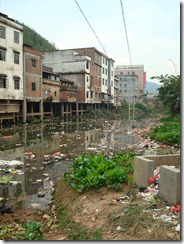I received the following email from Food Democracy Now, an advocacy group for sustainability in agriculture:
If failing to reach sensible solutions to the impending problems of climate change and the recent disaster in the Gulf were not enough, once again global citizens concerned about the future of our planet have been dealt a crushing blow.
This week a Russian court ruled that the world’s first seed bank outside of St. Petersburg, Russia may be destroyed in order to make way for a housing development. If allowed to stand, this decision will have a catastrophic impact on global plant diversity. Called a “Living Library”, the Pavlovsk Experimental Station [1] is widely considered the "crown jewel" of agricultural biodiversity, since 90% of the collection’s varieties are not found anywhere else on the planet. [2]
Scientists around the world are calling the decision an assault against biodiversity and the memory of the bitter struggle that kept this renowned seed bank alive during the darkest days of World War II. Founded in 1926 by Russian agricultural scientist Nikolai Vavilov, the Pavlovsk Experimental Station, became an icon of human perseverance when 12 Soviet scientists made a stand, choosing to starve to death rather than eat the precious seed and plant collection [3] as Nazi soldiers killed more than 1.5 million Russian soldiers and citizens during the grueling 900-day siege of Leningrad between 1941 and 1943. [4]
Besides this rich history, the Pavlovsk Station contains more than 5,000 rare varieties of fruits and berries from dozens of countries, up to 90% of which are in no other collection. [5] Unlike the majority of seed banks around the world today, the Pavlovsk Station is a field collection, meaning that most of the rare seeds are planted on the agricultural plot outside of St. Petersburg and moving the plants would take many years and most likely destroy much of the collection in the process. [6]
Now, Russia's Supreme Arbitration Court in Moscow wants to turn this priceless treasure of biodiversity into a “private housing estate”. [7] In an age of climate change and dwindling biodiversity, such a decision poses a direct threat to humanity and the future sustainability of our planet.
Tell Russia’s President Medvedev and Prime Minister Putin to stop this senseless destruction of the world’s seed heritage and stand up for biodiversity and the world’s future. Clicking on the link below will automatically sign your name to a petition calling for the Kremlin to halt the destruction of the world’s first seed bank.
http://action.fooddemocracynow.org/go/save_the_worlds_first_seed_bank_act_now/212?akid=178.68528.AVKMw2&t=7
With more than 986 species of strawberries and 634 varieties of apples, the Pavlovsk Station contains one of the world’s largest collections of rare fruits and berries. [8] Gathered over 84 years, during lean years and hard times, the Russian seed bank is where the future to agricultural solutions may be found, but only if it is allowed to survive. Once a seed is lost, its rich genetic history is gone forever.
In an age where the impacts of climate change are only beginning to grow more pronounced, allowing the destruction of this collection rises to a threat against humanity as great as that faced by Russians as they battled for their survival during the siege of Leningrad. The future of our planet and our species rests not in the development of land for real estate, but in the wise management of the dwindling natural resources that are still available to us.
Today, droughts, floods, extreme heat and water shortages are ravaging the major food producing regions of the world, including California’s Central Valley, Australia and Russia’s own wheat belt. Just last week, the real threat of climate change shook Russia and the world, when Russian Prime Minister Vladimir Putin banned the export of the nation’s wheat due to the severe drought as Russia withers under the worst heat-wave in more than 130 years. [9]
Plant scientists around the globe regularly use plants and seed stock from the Pavlovsk collection as “raw material for developing new varieties that are more productive, for example, or better adapted to a warming climate.” [10] To combat the growing instability brought on by climate change, the invaluable genetic legacy contained in these rare seeds must be maintained.
Allowing the destruction of this priceless seed bank will take away one of the leading tools that scientists have in combating climate change. Destroying these seeds is literally eradicating one of nature’s most precious resources at a time when farmers and society need it the most in order to meet the growing problem of feeding a planet in the face of rapidly changing weather patterns.
While the decision this week was immediately appealed, scientists in Russia and concerned citizens around the world have only 30 days to organize as the decision was immediately appealed before the Supreme Arbitration Court of Russia. Already, groups are organizing to call attention to this terrible decision, including the Global Crop Diversity Trust and scientists at the Pavlovsk Experiment Station. [11]
Food Democracy Now! asks you to join us in this urgent plea to protect biodiversity and the rich biological and historical legacy that these seeds and this collection represents. We may not have much time or even much hope at this point, but this planet will not go down in flames without a fight!
Tell Russia’s President Medvedev and Prime Minister Putin to stop this senseless destruction of the world’s seed heritage and stand up for biodiversity and the world’s future. Clicking on the link below will automatically sign your name to a petition calling for the Kremlin to halt the destruction of the world’s first seed bank.
http://action.fooddemocracynow.org/go/save_the_worlds_first_seed_bank_act_now/212?akid=178.68528.AVKMw2&t=9
Please act today - it only takes a moment - and the consequences of inaction are too great!
Thank you for participating in food democracy –
Dave, Lisa and the Food Democracy Now! Team
We need your help to keep the pressure on! Please donate to Food Democracy Now today – whether it’s $10, $25 or $50. http://fdn.actionkit.com/go/donate/133?akid=178.68528.AVKMw2&t=11
We rely on folks like you to keep us going. Thanks again for your support.
Sources:
1. Pavlovsk Experiment Station website
http://action.fooddemocracynow.org/go/202?akid=178.68528.AVKMw2&t=13
2. “Living Library” of Fruit Plants May Fall to Russian Bulldozers, Discover Magazine, August 12, 2010
http://action.fooddemocracynow.org/go/203?akid=178.68528.AVKMw2&t=15
3. “Pavlovsk seed bank faces destruction”, U.K. Guardian, August 8, 2010
http://action.fooddemocracynow.org/go/204?akid=178.68528.AVKMw2&t=17
4. “The siege of Leningrad – deadliest blockade of WWII”, RT, July 12, 2010
http://action.fooddemocracynow.org/go/205?akid=178.68528.AVKMw2&t=19
5. “Plant Repository at Risk in Russia”, The New York Times, Green, August 6, 2010,
http://action.fooddemocracynow.org/go/206?akid=178.68528.AVKMw2&t=21
6. “Development Threatens One of World’s Oldest Fruit Seed Collections”, Civil Eats, August 9, 2010
http://action.fooddemocracynow.org/go/207?akid=178.68528.AVKMw2&t=23
7. “Pavlovsk seed bank faces destruction”, U.K. Guardian, August 8, 2010
http://action.fooddemocracynow.org/go/204?akid=178.68528.AVKMw2&t=25
8. “Analytical review of the current status and maintenance of fruit and berry germplasm
accessions at Pavlovsk Experiment Station of the Vavilov Institute of Plant Industry (VIR)”,
Vavilov Institute of Plant Industry (VIR) website
http://action.fooddemocracynow.org/go/208?akid=178.68528.AVKMw2&t=26"986"+Pavlovsk&cd=1&hl=en&ct=clnk&gl=u
9. “Drought Strains Russian Wheat Supplies”, The New York Times, August 3, 2010
http://action.fooddemocracynow.org/go/209?akid=178.68528.AVKMw2&t=28
10. “Development plans threaten Russia seed bank for unique fruit varieties”, Los Angeles Times, August 10, 2010
http://action.fooddemocracynow.org/go/210?akid=178.68528.AVKMw2&t=30
11. “Europe's largest berry bank faces closure”, Nature, August 11, 2010
http://action.fooddemocracynow.org/go/211?akid=178.68528.AVKMw2&t=32


